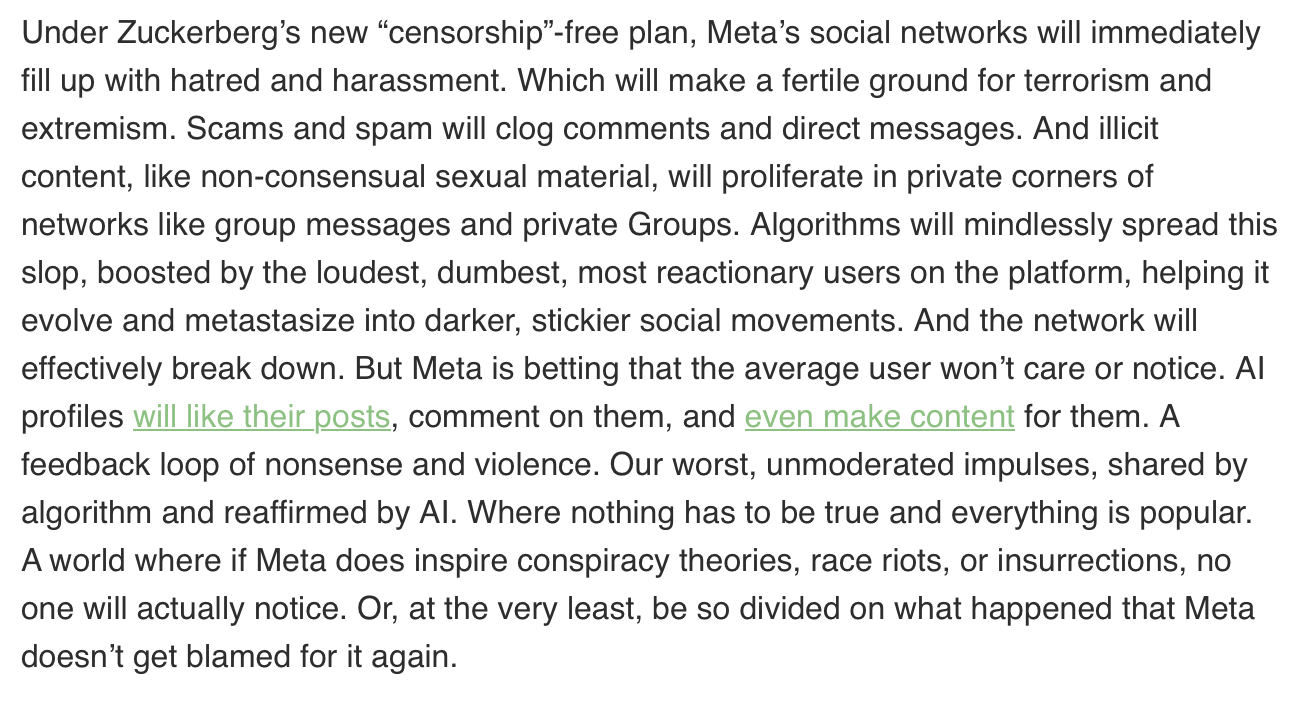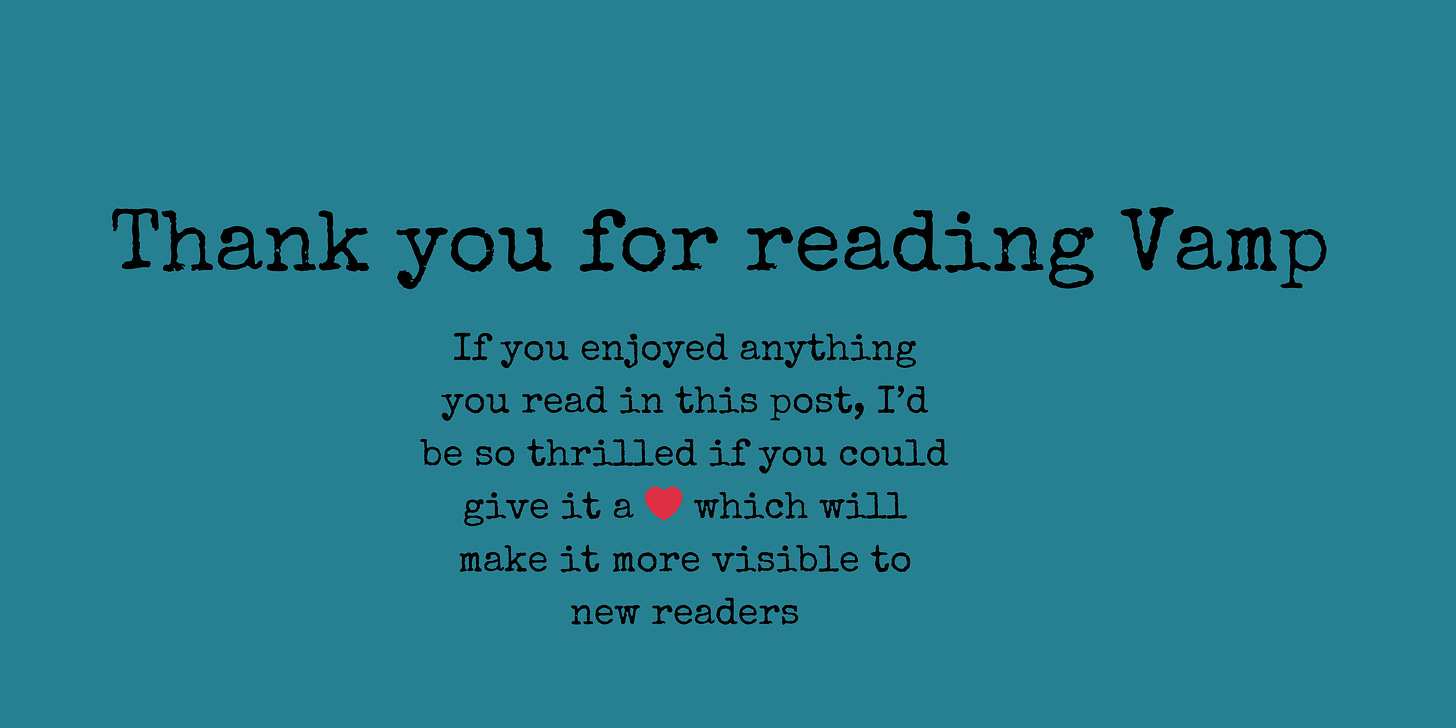Is it real? Is it true?
On Facebook: Meghan Markle’s “daughter,” a cheetah cub brought back to life – compelling stories, utter bullshit. Here’s why you should question every post you see.
Screenshot from an AI-generated video of park rangers and a mother cheetah with her reviving cub (substantially enlarged, hence, much easier to see the AI distortions).
I have agonised over what I would write about for this, the first edition of Vamp for 2025. I could share thoughts (and I have a few) about the South-East Asian cruise 🚢 I was on with my mother over Christmas and New Year. (There are those who cruise and there are those who would rather stick pins in their eyes and I am in the latter group but my 88-year-old mother who is a most persuasive character is in the former.) I could write about my dog Lola’s seizure/fit 10 days ago which took 10 years off my life – for now, she seems fine 🤞 I’m still recovering. I could talk about the interesting man I met in the dog park today. I could write about the horror of that man in the White House again … but …
Instead, I have decided to write on a far more urgent, important matter – that of Meghan Markle and her daughter, Lilibet.
On my Facebook feed the other day a post popped up of Markle and a little red-headed cherub of a child with a tumble of red curls. Caption: “Meghan Markle publicly shared a photo of her daughter, Lilibet, for the first time.” Under the post were a thousand or more likes and hundreds of comments. Most were along the lines of, “aw, gosh, isn’t she cute”.
But the Duke and Duchess of Sussex fiercely protect their brand, their image. You can be sure that if they release a photograph of Markle with Lilibet, her now three-year-old daughter, every newspaper in the world, every television channel, will publish or broadcast it. A rat was stinking out that Facebook post … I checked the Duke and Duchess’s official Instagram account. There was no photograph of Meghan and a cherubic curly red-haired daughter.
As I started to write this post, I went back to find that Facebook post – the link I’d saved was no longer active. I searched then on Facebook for “Meghan Markle and daughter”. Three other posts with images came up: one allegedly of Markle and her daughter but this time it was a completely different daughter, completely different bone structure, completely different hair colour, a child with a manipulated, talent-quest precocity. (The Facebook account which posted the image, A Colorful Life, has 1.2 million followers.) The second post that popped up showed Markle with yet another child, a much older, seemingly almost-teenage child, with the caption – “On her 5th birthday, Meghan Markle shared a photo of her daughter Lilibet on Instagram, causing a stir in the royal family”. The third post from an account called Advanced Life Skills (1.7 million followers) had the same photo I’d first seen – Markle, allegedly with her red-haired cherub. The caption: “Meghan Markle publicly shared a photo of her daughter, Lilibet, for the first time, leaving the entire UK stunned.”
Each of the images had hundreds of likes, comments and shares and each was AI shit, manipulated or assembled or simply invented images. And, while some people called out the posts as AI fakes, many others fell for them – “ah, she’s a little beauty”, “what a beautiful pic of mother and daughter”, “Harry and Meghan’s children are the most adorable! Love that red hair and cute little smile!”
A few days after I first saw the Markle-and-daughter pic on Facebook, another post landed in my timeline. It featured a heart-wrenching video – a cheetah cub lies in a waterway, apparently drowning, its mother leans over it, nudges it, licks it. Then, behold, a jeep pulls up, rangers jump out, one massages the cub’s heart, the rangers’ hold back the mother cheetah while the cub falteringly comes back to life. The rangers towel dry the cub while the mother looks on, then, into the sunset the jeep drives, mother and cub stand together close. Aw, gee, how wonderful.
The video has been shared by any number of accounts; the post I first saw has had 78 million views. More than two million people have liked, loved or given the thumbs up to it, among them, several of my own Facebook friends including a couple of journalists. Comments included: “Amazing wonderful, loving, caring, human beings. There’s just not enough of them” and “It looks like a cheetah to me. If they are cheetahs they are very easily tamed. They were in Cleopatras [sic] court. I interacted with one, on one of my trips to Africa. Very special.” There are not enough eye-rolling emojis to cover this. Perhaps less than 20% of comments were along the lines of, “AI garbage”.
And another one: in late January on her Threads account (432,000 followers), American journalist Katie Couric, former CBS News anchor and founder of Katie Couric Media, shared a short video of a pretty blue and yellow bird holding its wings in an umbrella formation over a bunch of chicks in a nest as torrential rain falls. Couric’s caption: “💙💙💙💙💙💙”. Perhaps Couric didn’t realise it was AI (it clearly is AI), perhaps she knew it was but just thought it was pretty. Either way, someone of her stature, a journalist, should not be posting dubious images without either checking them first, or labelling them as AI. Among the comments: “Good lord. Why are you sharing this?”; “Headline: Famed journalist cannot detect AI”; and “Don’t encourage them. AI is slowly going to overwhelm us if we don’t push back.” (When I last looked, one of the headline pieces on the Katie Couric Media home page was titled, “How to handle bothersome bunions”. How the mighty lose their shit.)
You might dismiss a fake photograph of Meghan Markle and her purported daughter, or an AI-generated video of rangers bringing a cheetah cub back to life, or a pretty blue and yellow mother bird making a pretty umbrella with her wings, as harmless entertainment. But this kind of fabricated imagery isn’t just a bit of fun – it’s canary in the coal mine stuff, a stark warning of how easily misinformation spreads in a world where the collapse/fragmentation of trustworthy news sources has left people increasingly vulnerable to manipulation. If vast numbers of the gullible can be fooled by these sad fabrications, what more insidious AI deceptions might bad actors be able to pull off on social media? What AI stunts, for example, might Australian right-wing nut jobs pull in the lead up to the forthcoming federal election.
And yet, as you’ll likely know, on January 7, Mark Zuckerberg’s Meta (the owner of Facebook, Instagram, Threads and WhatsApp), announced it was dropping independent fact-checking. In a statement, Meta’s chief global affairs officer, Joel Kaplan, noted:
“Meta’s platforms are built to be places where people can express themselves freely. That can be messy. On platforms where billions of people can have a voice, all the good, bad and ugly is on display. But that’s free expression.”
The following day, in his Garbage Day newsletter, the savvy American internet commentator Ryan Broderick wrote:
A week or so later, Zuckerberg joined the hellscape of arse-licking broligarchs at Donald Trump’s inauguration (to which he’d donated USD$1 million … and at which he got caught leering at Jeff Bezos’s girlfriend’s chest).
“Messy” and “ugly” don’t even begin to describe where we’re heading. A Vox article noted:
“Broadly, Meta’s announcement signals a willingness among tech companies to cater to Trump as they seek to preserve their business prospects and avoid political retaliation from a frequent, strident critic. Its shifts in content moderation also have serious implications for the types of posts and misinformation that can spread on its platforms, which include Facebook, Instagram, and Threads.”
The Vox article was muted in its commentary. “Total information collapse,” is how the English writer Carole Cadwalladr headed a piece on the profound consequences of “the coming age of information chaos”. (Cadwalladr is a longstanding and distinguished reporter of how bad players can manipulate online information.) She writes: “The biggest danger in the coming months and years will be the exhaustion of our critical faculties, our failure to withstand the noise, and to retreat into personal spaces.” (I’d really urge you to read Cadwalladr’s Guardian story, “How to survive the broligarchy: 20 lessons for the post-truth world”.)
So if we are entering or in an age of information chaos, if Zuckerberg and the execrable Musk aren’t going to do anything to ensure that what account holders publish on their social media platforms is factual, what can we do?
Some are quitting the platforms altogether. “It’s like a frat house basement at 10am. Why the fuck am I here,” said Culture Study Substacker Anne Helen Petersen. “Climate monsters, cultural monsters, political monsters. You can’t fight them by consuming news, or quote-tweet dunking, or sharing a graphic. … If this is indeed a new world, we need new tactics, new tools, and new energy. None of which are hiding on Instagram.”
For my part, I’ve deleted my account on Elon Musk’s X, formerly Twitter; he is the devil incarnate and it would have been unconscionable to stay. Zuckerberg might be little better, but for many people (including me) who have come to rely on his social platforms for their work, including journalists who have been advised for years that we need to build our own brands (🤮), who use it to promote our articles, source subjects for stories and pick up on trends, leaving the platforms altogether is, for now, a last option.
Besides, quitting social media platforms will not stop the gazillions who remain from being fed misinformation. I’m starting to think it’s more important that we stay than we go.
So, if we choose to stay, what can we do? I believe we can each make a difference. I welcome your thoughts, but these are mine:
Never again should we assume a post we see on a social media platform is factual, accurate, true, even if it has been shared by a friend or someone we think is trustworthy.
We should not let a suspicious, likely AI-generated post in our feed pass us by. Even if we are not 100% sure the post in our feed is fake, we should comment on that post, question it, interrogate it. Leave a comment – “What is the source of this information?” “Are you sure it’s accurate?” “Is this post AI?” “Is there scientific data to support this position?” (Especially, of course, in the case of posts about climate change and vaccinations purporting to be authoritative; science matters.) If other readers see our comments interrogating the accuracy of a post, perhaps there is some small chance that a seed of doubt will be planted in their minds.
We should talk to our family and friends (especially our older more information-vulnerable family and friends). We should encourage them to be distrustful, cynical about everything they see; we should discourage them from sharing anything. Likes and shares push bullshit higher in social media platforms’ algorithms.
We should seek out and promote reliable sources of information. While mainstream media gets a bad rap, I know that media organisations such as the ABC, SBS, the BBC, The Sydney Morning Herald and The Age, The Guardian, The New York Times, The New Yorker, Mother Jones and ProPublica are utterly invested in doing their best to deliver independent, unbiased factual news. There are many, many other brilliant, independent journalists working to share factual information. (Ping me a note if you want me to share more info on this.)
From American historian Timothy Snyder: “Avoid pronouncing the phrases everyone else does. Think up your own way of speaking, even if only to convey that thing you think everyone is saying. Make an effort to separate yourself from the internet. Read books.” In my words: Do your own research. Don’t parrot what your husband or your mother or your brother-in-law or your uncle or your best mate says. They likely don’t have a clue what they’re talking about.
A couple of days ago, a video of the late great actor Robin Williams tickling a gorilla popped up on my Facebook feed. It was, on the face of things, just lovely. But, the video seemed too good to be true. I did some Googling. It seems to have been true. It’s awful not to trust but the consequences of trusting blindly will be far worse. Don’t trust anything you see on social media.
Regular readers, I will return with normal programming (food, travel, reading etc) soon … getting this post down took more time than I had expected.
Wild thing
I watched this, best laugh, only later realised it was five years old, from the first go-around of this insanity. And we’re back here. But, BEST laugh!
Socials (diversions, hot takes, news)
(via Bluesky; more works by the Swedish photographer here)
(via Bluesky; story here)
Plus, from The New York Times:
“[U.S.A.I.D.] money has restored coral reefs in the Seychelles, helped create a national park in Vietnam and turned former guerrillas into tour guides in Colombia. It has established tiger conservation programs, and brought back wildlife to areas decimated by bloody civil unrest.
All those are among the surprising programs affected by the Trump administration’s possible shutdown of the United States Agency for International Development, which, in addition to its other work, has established and maintained overseas national parks and conservation areas.
That role now has an uncertain future. On Friday, the U.S.A.I.D. website posted a notice that most of the work force will be placed on leave. Congressional Democrats say any move to eliminate the agency could be illegal.”
🧧🐲🐴 And, for all the horses out there … via The South China Morning Post …
Ah, we can only hope …
Stolen words
“Growing, ripening, aging, dying – the passing of time is predestined, inevitable. …There is only one solution if old age is not to be an absurd parody of our former life, and that is to go on pursuing ends that give our existence a meaning – devotion to individuals, to groups or to causes, social, political, intellectual or creative work… In old age we should wish still to have passions strong enough to prevent us turning in on ourselves. One’s life has value so long as one attributes value to the life of others, by means of love, friendship, indignation, compassion.”–Simone de Beauvoir, The Coming of Age (1970), via Marginalian.




















We missed you! Hope Lola is well?
Nice to have you back ♡.